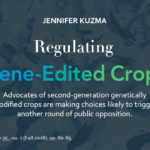
Blog: We must do better…
Todd Kuiken, June 11, 2020 | The following reflection was part of a special GES colloquium held on June 5, 2020, discussing the new USDA regulations on GM crops. Which was held in the midst of national protests against police brutality. They are my personal reflections in support of #blacklivesmatter and the systemic racism and inequalities seen throughout our institutions....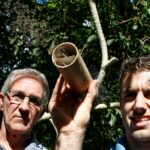
Genetically modified mosquitoes could be released in Florida and Texas beginning this summer – silver bullet or jumping the gun?
Jennifer Kuzma, June 3, 2020 | Release of GM mosquitoes in Florida is imminent. But a multidisciplinary team of scientists believe that more studies are needed first. They encourage a publicly accessible registry for GM organisms....
Blog: COVID-19 Reveals the Personal Side of Globalization – GM Researchers Should Take Note
Nora Haenn, 5/20/2020 | COVID-19 has shown us, there’s an important consequence for the way globalization is both local at all points and persistently invisible in its entirety....
Blog: Yes, and…
Royden Saah and Eli Hornstein, 4/22/2020 | To counter the COVID-19 pandemic, YES we can be responsible AND take urgent, unfamiliar action....
COVID-19—Biotechnology Is Never Enough
The currently-unfolding COVID-19 case boldly underscores the reality that science and technology are never enough to solve global health problems alone. Rather, we need a strategic and systematic integration of social sciences, risk sciences, and communication along with science, technology, and innovation to adequately meet the challenges of emerging global risks, such as COVID-19. ...
Lessons Learned for Risk Governance of Synthetic Biology, Nanomaterials, and Other Emerging Technologies in a Post-2020 World
Khara Grieger and Todd Kuiken, Dec. 13, 2019 | On December 9th, a symposium was held at the 2019 Annual Meeting of the Society for Risk Analysis, entitled “Risk Analysis of Engineered Nanomaterials: Where Have We Been, Lessons Learned, and Transfer of Knowledge to Other Emerging Technologies,” as a part of the Advanced Materials and Technologies Specialty Group....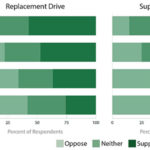
Does the US public support using gene drives to control agricultural pests?
Mike Jones, Sep. 11, 2019 | The development of gene drives is progressing more rapidly than our understanding of public values towards these technologies. Findings from this research can inform responsible innovation in gene drive development and risk assessment....Continue reading "Does the US public support using gene drives to control agricultural pests?"

Faculty Spotlight: Khara Grieger
Patti Mulligan, July 15, 2019 | INTERVIEW: We sat down with the GES Center's newest Senior Research Scholar, Khara Grieger. She joined our team in the spring of 2019, but has already given a colloquium and is working on several nanotechnology-related research projects....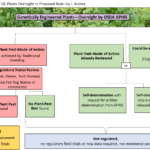
Biotechnology Oversight Gets an Early Make-Over by Trump’s White House and USDA: Part 2 – The USDA-APHIS Rule
Jennifer Kuzma, July 2, 2019 | USDA-APHIS has proposed an oversight process for GE crops that appears to be a significant departure from the current one. This article discusses the features of the proposed new rule, along with its strengths and weaknesses and my recommendations for how it should be amended. ...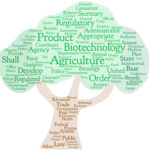
Biotechnology Oversight Gets an Early Make-Over by Trump’s White House and USDA: Part 1—The Executive Order
Jennifer Kuzma, June 18, 2019 | Last week, the Trump administration set the tone for its oversight of agricultural biotechnology (ag biotech) through two major actions: 1) Signing the Modernizing the Regulatory Framework for Agricultural Biotechnology Products Executive Order; and 2) Proposing a draft rule on the Movement of Certain Genetically Engineered Organisms (GEOs), changing how USDA reviews GE plants....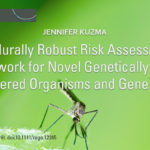
Procedurally Robust Risk Assessment Framework for Novel Genetically Engineered Organisms and Gene Drives
Jennifer Kuzma, March 8, 2019 | This article reviews the current state of gene-editing regulation for crops, illuminating the ways in which technology developers are repeating practices that may lead to the public and ethical failures of the first generation genetically engineered crops, and argues that the contentious socio-political history of genetic engineering will repeat itself for gene editing if these continue....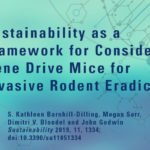
Sustainability as a Framework for Considering Gene Drive Mice for Invasive Rodent Eradication
March 4, 2019 | Sustainability as a Framework for Considering Gene Drive Mice for Invasive Rodent Eradication, by S. Kathleen Barnhill-Dilling, Megan Serr, Dimitri V. Blondel and John Godwin. Abstract: Gene drives represent a dynamic and controversial set of technologies with applications that range from mosquito control to the conservation of biological diversity on islands. Currently, gene drives are being developed in mice that may one day serve as an important tool for reducing invasive rodent pests, a key threat to island biodiversity and economies. ...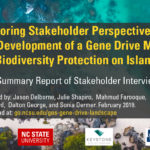
Report: Stakeholder Perspectives on Gene Drive Mice for Biodiversity Protection on Islands
Jason Delborne, February 20, 2019 | This article reviews the current state of gene-editing regulation for crops, illuminating the ways in which technology developers are repeating practices that may lead to the public and ethical failures of the first generation genetically engineered crops, and argues that the contentious socio-political history of genetic engineering will repeat itself for gene editing if these continue....
Can genetic engineering save disappearing forests?
Jason Delborne, January 18, 2019 | Forests in the US face many threats: climate change, invasive species, pests and pathogens. Could genetically engineering trees make these plants more resilient?" ...Continue reading "Can genetic engineering save disappearing forests?"
